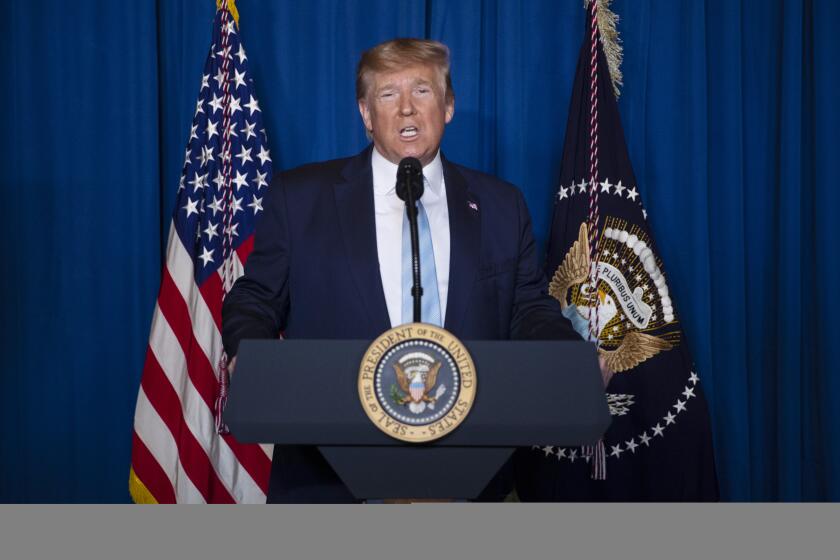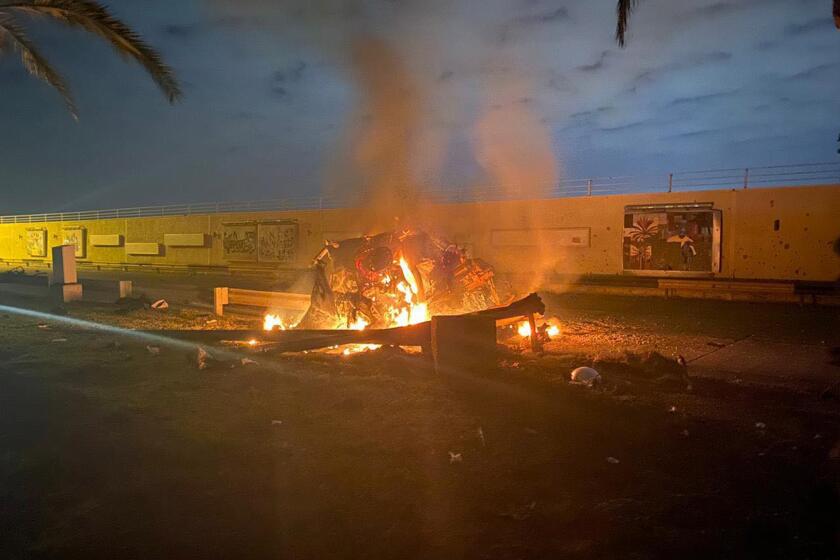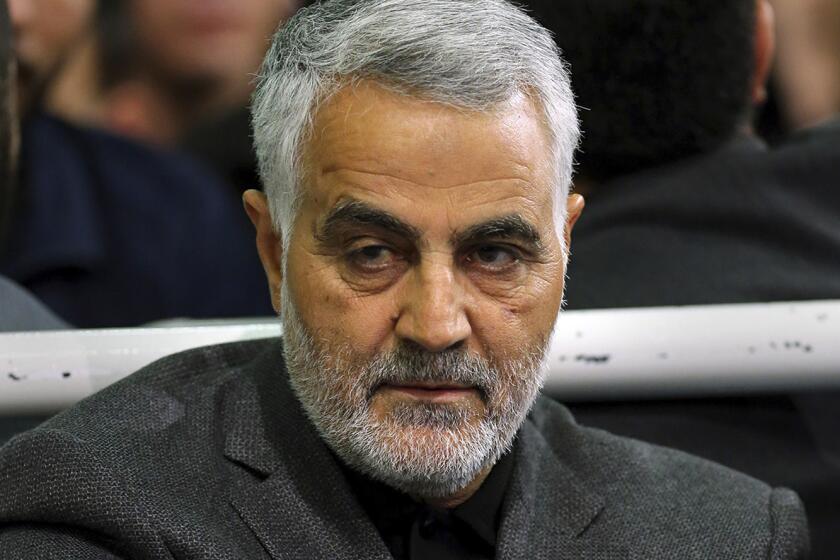With tensions rising, new focus emerges on Americans jailed in Iran
- Share via
For Joanne White, the mother of an American citizen from San Diego who is imprisoned in Iran, the last year and a half already felt like an unceasing nightmare. But things just got worse.
With tensions rising between the U.S. and Iran after President Trump’s targeted slaying of Gen. Qassem Suleimani — one of Iran’s highest-ranking officials — White’s concerns over the safety of her son, Michael, a U.S. Navy veteran, have intensified.
“I’m totally depressed. With all this stuff with Iran and the U.S., I don’t know if [the U.S. government] is able to negotiate his release,” she said in a phone interview with The Times. “Tensions have already been bad.”
There are currently five Americans believed to be in Iranian custody. Since the Suleimani killing Friday in Iraq, several family members said in interviews that the new developments place an increased focus on securing the release of their loved ones. They have issued calls for Trump to find a way to bring their relatives home.
“I urge both American and Iranian leaders to engage in discussions on further exchanges that would benefit both countries and at the same time bring my family home,” said Babak Namazi, whose dual-national brother and father have been imprisoned in Iran for four years.
Namazi’s brother was arrested in Tehran in October 2015 on espionage charges that Babak says were trumped up. Their father was arrested after he traveled to Tehran in February 2016 to try to secure his son’s release. Both have been sentenced to 10 years in prison.
White, convicted of mocking Iran’s supreme leader, was the first of two U.S. citizens arrested in Iran after Trump won the 2016 presidential election. Trump has on numerous occasions said that freeing Americans detained abroad is a top priority in his administration.
Iran has vowed “harsh retaliation” as tensions soar after a U.S. airstrike near Baghdad’s airport that killed a top Iranian general.
During the last few months of 2019, Tehran suggested that it was open to prisoner swap negotiations. With the help of the Swiss government, the last prisoner exchange took place in December.
In that exchange, the second person arrested after Trump took office, Chinese American scholar/researcher Xique Wang, was returned home, in a swap for Massoud Soleimani, an Iranian scientist jailed on charges of violating trade sanctions.
Left in limbo were both Namazis and White, as well as Morad Tahbaz, an Iranian American environmental activist; and Robert Levinson, a former FBI agent. And now, prospects for additional prisoner swaps are up in the air, said Jon Franks, a spokesman for the White family.
“At the moment, we are unaware of any meaningful steps the U.S. government is taking to secure his release,” he said, adding that there could be actions Washington is taking that he is not aware of.
Tensions between U.S. and Iran have been ratcheting up since May 2018, when Trump withdrew America from the 2015 landmark nuclear deal with seven world powers. Harsh rhetoric has been exchanged by officials and lawmakers from both countries since.
In late December, after a missile attack targeting an Iraqi military base killed an American contractor, U.S. officials blamed Iranian-backed militia groups.
That prompted the U.S. to carry out airstrikes that killed 25 people. Last week, pro-Iranian militia members stormed the U.S. Embassy compound in Baghdad.
Then came the U.S. airstrike near the Baghdad airport that killed Suleimani.
Trump chose to attack Suleimani after military leaders outline Iranian plans, officials say.
On Saturday, as Trump used Twitter to warn Iran of additional strikes if Tehran struck back, Namazi called on Trump to prioritize the release of his brother, Siamak, and ailing 83-year-old father, Baquer.
“There is never a bad time for humanitarian gestures,” he said.
Jason Poblete, a Washington-based lawyer who represented two former American prisoners in Iran, Nizar Zakkar and Wang, said Saturday that an exchange of prisoners could help deescalate tensions.
“As policymakers continue to defend U.S. national security interests, in light of the targeted of killing of IRGC Quds Force commander Suleimani, they must not forget the American and other hostages held in Iran and should redouble efforts to bring them home,” Poblete said. “Our fellow Americans need their nation now more than ever.”
Sharing similar sentiments is former U.S. hostage Barry Rosen.
Rosen was a 23-year-old press attache when he was taken hostage in Tehran following the U.S. Embassy takeover by Iranian protesters.
Rosen was among 52 Americans held hostage for 444 days. Even though it’s been 40 years since he was taken captive, Rosen empathizes with current American prisoners being held in Iran.
An Iranian general was killed in Iraq. Why did Trump want him dead?
“For me it’s part and parcel of my own body; spiritually I’m with these people,” Rosen, who is now 72 and lives in New York City, said. “For me their lives are profoundly important, because I can see myself in them, and I feel that they will go on suffering more now.”
For White, securing the release of her son, Michael, is of paramount importance. The 46-year-old Navy veteran’s health has apparently been deteriorating in recent months as he sits behind bars at Vakilabad Prison in Mashhad, eastern Iran.
In March, White was sentenced to 10 years in prison on charges of insulting Iran’s supreme leader, Ayatollah Ali Khamenei, and for sharing the private information of a woman he was visiting at the time. White had served 13 years in the U.S. Navy, working in aviation maintenance administration and later attended San Diego State, where he studied political science.
Her son has been in and out of the hospital in Iran and recently underwent surgery to have a cancerous melanoma removed, White said.
Recently she raised $1,000 in donations and sent it to the prison via the Swiss Embassy in December, but she said her son hasn’t been able to use it.
(Switzerland has represented U.S. interests in Tehran since the U.S. broke off formal diplomatic relations with the Islamic Republic due to the 1979 hostage crisis.)
“I ask him to call me more to make sure he is alive. His health was already bad and now it’s even worse,” White said, adding that it’s been over four months since the Swiss have been able to see him.
Getting hold of him by phone has also proven difficult, and discomforting. When she last spoke to him on Monday, she said, he told her he was nearly starving.
“I asked him to go to the warden and he said, ‘No I can’t do that, Mom. They put restrictions on me,’” White recalled her son saying. “‘I’m starving to death.’”
More to Read
Sign up for Essential California
The most important California stories and recommendations in your inbox every morning.
You may occasionally receive promotional content from the Los Angeles Times.













